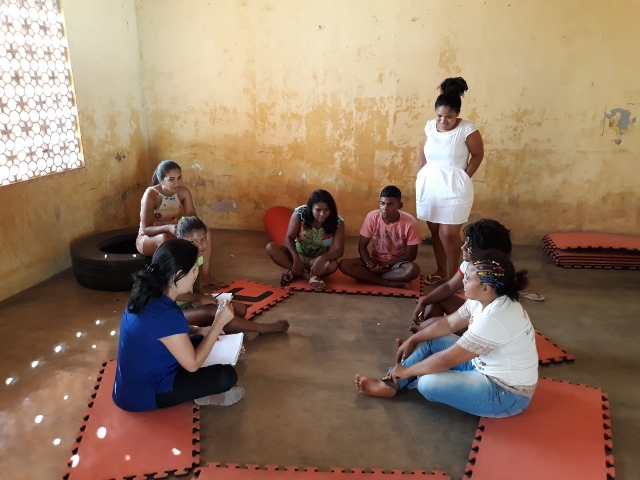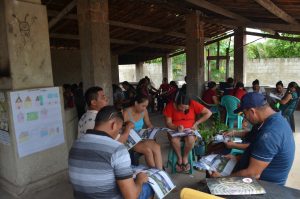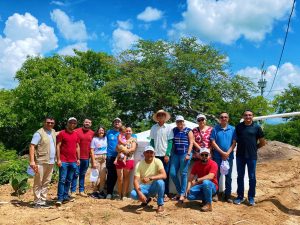Protagonism of the young quilombolas of Batoque
Protagonism of the young quilombolas of Batoque – United community, strengthened youth
The Quilombola community of Batoque is located in the city of Pacujá – Ceará. The so called “Quilombola” villages were created in former centuries, when evaded slaves formed their own communities, out of the reach of their slave masters, and have since maintained their union throughout generations. In the Batoque community there is a youth group, the JCC – Young Walking With Christ, founded in 1994. The group maintains its identity and is encouraged by the leadership of its elder members, in a continuous renewal and connections with its cultural roots.
Maria Vladiane Sousa da Silva, one of the group’s coordinators, says that “the community has always been very united, and we always fight for our rights”. Joseli do Nascimento Cordeiro, another member, points out that “the community gives full support to its young people, always being united in all activities. Currently, it is the young that are at the forefront of several projects, such as our association’s initiatives and the community leisure activities”.
The meetings of the youth group are usually held Saturday nights, when they discuss various issues of community interest, such as the political conjuncture, prejudice, racism, agroecology, public policies, rights, abortion, among many others. In addition to the debates, the group organizes a movement to raise funds for the construction of the chapel of ‘Nossa Senhora da Conceição’, through fairs, bingos and raffles. They also perform many other collective cultural actions in the community.
When asked about JCC’s goal, Maria Vladiane Sousa da Silva says “I want the young people to come together, so that the history of the Quilombo does not die, and always make it clear that in life, and for God, we are all the same”. Joseli points out that “the union of young people is important because of all social exclusion they suffer, in reason of being black, quilombolas, as we live in a society that marginalizes these characteristics. And despite the relationship with society in general having improved, there has been very difficult periods, including times when things got violent, so it is a natural thing that our people walk together and organize in groups as a way of defending themselves”.
The youth of Batoque are really the protagonists in their community, as they are at the forefront of actions such as the Batoque Rural Quilombos Remnants Community Association. Young people are also leading the organization of the Black Awareness Week, which takes place in November, with social activities such as coffee with the elderly, plays with children, storytelling and capoeira. This is a time when participants play capoeira and remember the history of the struggle of the first quilombo residents and together rescue part of their history.

Several families from the quilombola community participate directly in the Paulo Freire Project and are accompanied by CETRA. Through the project, young people have participated in workshops with themes such as ‘public policies for the youth’. The Paulo Freire project is carried out by the Center of Labor Studies and Worker’s Assistance – CETRA, the Ceará State Secretariat of Agrarian Development – SDA, an counts with support from the International Fund for Agricultural Development – IFAD.
Maria is part of the state youth network, supported by Caritas, where young people from all territories participate. Other young people from the community have already participated in regional, state and even international exchanges, such as Joseli’s participation in an event in Argentina, in the Latin American Semiarid Knowledge Exchange.
Joseli says that “it was an incredible experience, it was very important for me to see a region similar to ours, that has a lack of water, with rain just some few months of the year, and that is now starting to use our social technologies, like the ‘plate water cisterns’; I hope this can help and develop the lives of families in other countries”. He also says that “it was a time of exchanging experiences, to strengthen as a person, and to strengthen the community. It served to reaffirm that everything we do and fight may take time, but it sure works out in the end. And persistence will always be the best way.”
The young people of Batoque, even facing many obstacles, have been able to enter technical courses and university environments such as Escola Familia Agrícola – EFA, Vale do Acaraú State University – UVA, Federal Institute of Ceará – IFCE and University of International Integration of Lusofonia Afro -Brazilian – UNILAB. In addition to all these activities, the young also participate in male and female soccer teams, perform dance, theater and capoeira training, showing that despite their responsibilities and difficulties, they continue to resist in the Semiarid, living with pleasure, joy and unity, through social and cultural activities that strengthen their community and its historical roots.


